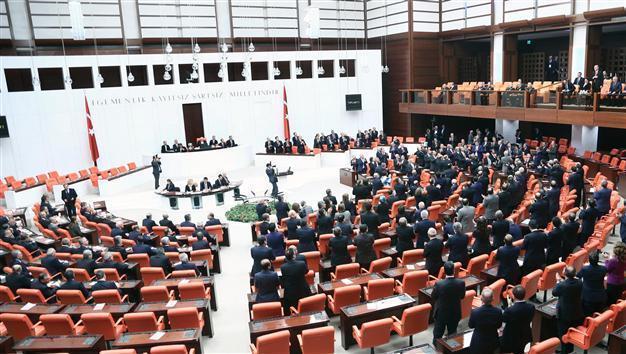Turkey's new parliament to convene on June 23 as final election results announced
ANKARA

DHA Photo
Turkey’s top election body has eventually announced the final results of the June 7 general election, prompting all eyes to turn to the first sitting of the new parliament on the fifth day after the announcement of the results, on June 23.According to results announced on June 18 by the Supreme Election Board (YSK), voter turnout was 83.92. The Justice and Development Party (AKP) received 40.66 percent of the total, the Republican People’s Party (CHP) won 25.13 percent, the Nationalist Movement Party (MHP) won 16.45 percent and the Peoples’ Democratic Party (HDP) won 12.96 percent.
Accordingly, the AKP will have 258 seats in the 550-seat parliament, the CHP will have 132, while the MHP and the HDP will have 80 seats apiece.
The AKP therefore failed to secure the majority in the 550-seat parliament required to rule alone.
First job: electing parliament speaker after taking oath
Following the announcement of the official results, the newly elected members of the 25th term of Parliament of the Republic of Turkey will gather at 3.00 p.m. on June 23. The oath-taking ceremony at first sitting will be chaired by the oldest deputy, assisted by the six youngest deputies as secretaries.
The oldest deputy in the new parliament will be Deniz Baykal, the former head of the CHP, who will serve until parliament elects a speaker.
Candidates to hold the speaker’s seat from among the deputies must submit their bids within five days after the first sitting. The speaker will then elected by secret ballot by parliamentarians.
In the first two ballots, two-thirds of the total number of deputies, and in the third ballot, an absolute majority of the total number of deputies, are required. If an absolute majority cannot be obtained in the third ballot, a fourth ballot takes place between the two candidates who obtained the highest number of votes. In the fourth ballot, the candidate receiving the highest number of votes is elected speaker.
This process must be completed within five days of the nomination of candidates.
As is required by Turkish laws and political customs, President Recep Tayyip Erdoğan is expected to give the mandate to form a government to AKP leader Ahmet Davutoğlu, as the head of the party with most seats in parliament. Turkey’s 63rd government must be formed within 45 days of the mandate being given, which pushes Davutoğlu to act as swiftly as possible and to engage in coalition negotiations with other political parties. The president has the right to take the country to early polls if political parties fail to form a government within 45 days.
The newly formed government must carry a vote of confidence in parliament in order to stay in office.
The government program will be debated and a vote of confidence will be held in a plenary session of the parliament. If the newly formed government fails to obtain the confidence of a simple majority of deputies present in the plenary, it is dismissed from the office.
The prime minister or another minister will read out the program of the newly appointed government in the plenary within a week after the formation of the government.
Under the constitution, upon consulting the parliament speaker, the president may decide to hold parliamentary elections if cabinet fails to receive a vote of confidence or is compelled to resign by a vote of no-confidence, or if a cabinet cannot be formed within 45 days.
In the event of an early election, votes will be cast on the first Sunday after the 90th day after the president’s decision.
Last weekend, Erdoğan said a snap election would be “inevitable” if both the AKP and the CHP fail in efforts to form a new government within the constitutional limit of 45 days.
He said he planned to grant a mandate to form a new government first to the AKP.
“Let’s say the party who came first in the election cannot manage [to form a government] and neither can the party that came second ... In such a case, going to the ballot box again as per the constitution would be inevitable,” Erdoğan said.
“I wouldn’t call this an early election, but a re-run,” he added.
















